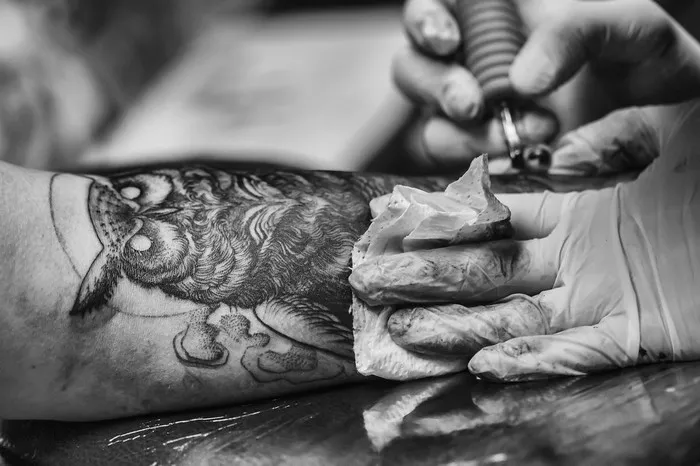Tattoo shops are unique environments where artists and clients come together to create permanent works of art on the body. While these spaces are often filled with creativity, expression, and excitement, it’s crucial to maintain respect and professionalism. Communication is key in any setting, but in a tattoo studio, what you say—or don’t say—can significantly impact the experience for everyone involved. Here’s a comprehensive guide on what not to say in a tattoo shop, ensuring a positive atmosphere for artists and clients alike.
1. “Can You Do It Cheaper?”
Tattoo artists invest years honing their craft and building their skills. Asking for a discount not only undermines their expertise but also devalues the art form. Tattoos are a long-term investment, both financially and artistically. Remember, you’re paying not just for the ink but for the artist’s time, experience, and creativity. Respect their pricing and recognize the value they bring to the table.
2. “I Want Something Unique, But Just Like This Pinterest Image.”
Bringing in reference images can be helpful for conveying your ideas to the artist. However, insisting on an exact replica of someone else’s tattoo undermines the creative process. Tattoo artists are artists first and foremost—they thrive on originality and personalization. Trust their expertise to adapt the design to suit your preferences and body placement. Embrace the opportunity to collaborate and create something truly one-of-a-kind.
3. “I Was So Wasted When I Got This.”
While it might seem like a funny anecdote to share, admitting that you were intoxicated during a previous tattoo session is neither amusing nor responsible. Alcohol and drugs can thin the blood, making the tattooing process riskier and potentially affecting the outcome of the tattoo. Moreover, it reflects poorly on your judgment and respect for the craft. Be honest with your artist about any concerns or discomfort you may have, but leave tales of drunken escapades at the door.
4. “Can You Hide This From My Parents/Spouse/Boss?”
Tattoos are personal expressions of identity, and it’s understandable that you may want to keep them private from certain individuals in your life. However, asking your artist to conceal a tattoo or compromise its design to please others is unfair to both you and the artist. Tattoos should be chosen and worn proudly, not hidden out of fear or shame. Consider having an open and honest conversation with the important people in your life about your decision to get tattooed.
5. “I’m Not Sure What I Want, But I’ll Know It When I See It.”
While it’s okay to be uncertain about the specifics of your tattoo design, coming into the studio without any direction can be challenging for both you and the artist. Tattoo consultations are most productive when you have at least a general idea of the style, subject matter, and placement you’re interested in. Take some time to browse through portfolios, gather inspiration, and articulate your preferences before scheduling a consultation. This will ensure a more fruitful and satisfying collaboration with your artist.
6. “I Want This Tattooed Wherever It Fits.”
Placement is key when it comes to tattoos. Different body parts have unique shapes, sizes, and skin textures that can influence the outcome of the tattoo. What looks great on someone’s forearm might not translate well to their ribcage or ankle. Trust your artist’s expertise in recommending suitable placements based on the design and your body’s anatomy. They’ll work with you to find the perfect location that enhances the aesthetic appeal and longevity of your tattoo.
7. “Can You Touch Up My Friend’s Work? It’s Really Bad.”
Critiquing someone else’s tattoo, especially in front of your artist, is not only disrespectful but also unprofessional. Every tattoo artist has their own style and approach, and what may not appeal to you could be someone else’s masterpiece. If you’re unhappy with an existing tattoo, discuss your concerns with your current artist in a constructive manner. They may be able to offer solutions for improvement or recommend a skilled artist specializing in cover-ups or modifications.
8. “I Want This Exact Design, But Bigger/Smaller.”
Tattoo designs are carefully crafted to fit specific body proportions and spaces. Altering the size of a design can compromise its integrity and visual impact. Trust your artist’s judgment in scaling the design appropriately for the chosen placement. They’ll consider factors such as detail level, line thickness, and negative space to ensure the tattoo ages well and maintains its clarity over time. Be open to their recommendations and understand that adjustments may be necessary for the best results.
9. “Can I Get A Discount If I Promote You On Social Media?”
While sharing your tattoo experience on social media can be a great way to support your artist and showcase their work, expecting a discount in exchange for promotion is not a fair trade. Tattoo artists rely on their skills and reputation to attract clients, and offering discounts undermines the value of their work. Instead of bargaining for discounts, show your appreciation by tipping generously, referring friends and family, and sharing your positive experiences organically on social media.
10. “I Want This Tattoo, But I’m Not Sure I’ll Keep It Forever.”
Tattoos are permanent commitments that require careful consideration and commitment. Expressing doubts about the longevity of your tattoo not only undermines the significance of the art but also raises concerns about your readiness for such a decision. If you’re unsure about getting a tattoo, take the time to explore temporary options or wait until you’re confident in your choice. Rushing into a tattoo you may later regret can lead to costly cover-up or removal procedures down the line.
In conclusion, communication is key in any tattoo studio. By avoiding these common pitfalls and approaching your tattoo experience with respect, clarity, and collaboration, you’ll ensure a positive and rewarding journey from consultation to completion. Trust your artist’s expertise, be open to their suggestions, and above all, cherish the opportunity to create meaningful art that reflects your unique identity and story.


